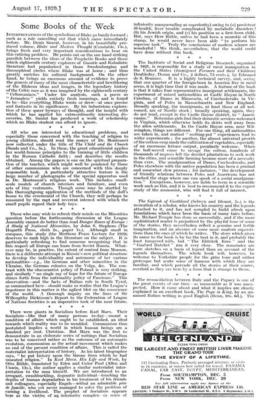There were giants in Socialism before Karl Marx. Their Socialism—like
that of many persons to-day—meant a condition of affairs which ought to be established, an ideal towards which reality was to be moulded. Communism thus postulated implies a world in which human beings are a hundred per cent. Christian. But Marx was the first to demonstrate in an elaborate series of writings that Socialism was to be conceived rather as the outcome of an automatic evolution; communism as the actual movement which makes an end of the present condition of affairs. This is called the materialist interpretation of history. As his latest biographer says, " he put history upon the throne from which he had unseated religion." In 'Karl Marx, His Life and Work, by Otto Riihle, translated by Eden and Cedar Paul (Allen and Unwin, 15s.), the author applies a similar materialist inter- pretation to the man himself. We are introduced to an arrogant, swashbuckling, dogmatic individual—touching the depths of human degradation in his treatment of his friends and colleagues, especially Engels—withal an admirable pore de famille, who yet never managed to solve the problem of earning a livelihood. The prophet of Socialism appears kve as the victim of ao inferiority complex—(a sense of inferiority masquerading as superiority) owing to (a) persistent ill-health, liver trouble complicated by metabolic disorders ! (b) his Jewish origin, and (c) his position as a first-born child. But, says Herr Riihle, unless he had been a neurotic of this stamp, he would never have been able " to perform his supreme task." Truly the conclusions of modern science are wonderful ! We think, nevertheless, that the world could have done without this book.
































 Previous page
Previous page